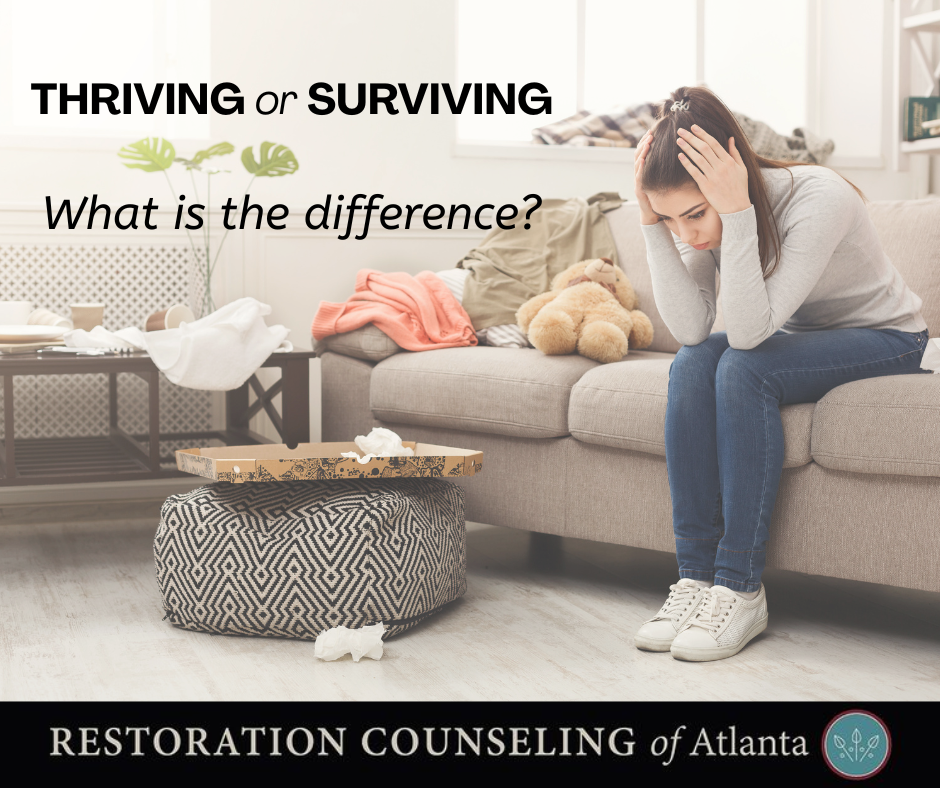What is the difference between surviving and thriving?
When I talk to new and prospective clients, I often tell them that one of my goals for our time together is to work myself out of a job. Part of how I understand my work as a professional counselor is to come alongside my clients and witness their pain. I allow them to grieve and teach them practical ways to reset their bodies, minds, and emotions and thrive. In other words, one of my hopes for most of my clients is to teach them to fish.
Give a man a fish, and you feed him for a day. Teach him how to fish, and you feed him for a lifetime.
You have probably heard this famous quote from the Chinese philosopher Lao Tzu. I want to suggest that in many ways, the difference between emotional surviving and thriving is like the difference between giving a man a fish and teaching him/her how to feed themselves.
Is change possible?
I work to offer my client a sense of feeling safe, secure, seen, and soothed in our time together. These four components are what Dr. Dan Siegel, Clinical Professor of Psychiatry at the UCLA School of Medicine, calls the basis for a secure connection. (Read more information about Dr. Seigel’s work here.)
These four “S” words are powerful and change how the neurons in our brain fire and wire together. The power of this connection is so transformative that I believe it ushers a reset and brings forth healing. When people feel safe, secure, seen, and soothed in their bodies, minds, and emotions, they shift out of survival mode. They move into a new season, into rewiring and learning, which leads to flourishing.
How does change take place?
We begin in a season of re-wiring (and grieving what they did not have in their stories). We work to identify the triggers or places in their story where they have felt a lack of security, safety, and being seen and soothed. In these tender places of pain, clients begin to taste what they were created for. They begin to understand the impact of being cared for. As we practice the skills of regulation, a habit of heart and mind develops. This enables us to recognize when our brains are stuck in fight, flight, freeze, or fawn, and we learn ways to tell our bodies we are safe.
Moving from Survival to Thriving
In time and with practice, clients can notice when they are stuck or dysregulated. Then they can use the tools and practices they have to return to a place of regulation and balance. This is where they learn how to fish!
Learning how to notice and name stuck places (dysregulation) and knowing how to return to neutral is called affect regulation. Affect regulation is the key to shifting out of being stuck in survival mode and being free to respond to an event without being stuck in unwanted reactions. Freedom and choice are a privilege of those who feel safe. Thriving follows an experience of safety – in that order, every time. Without a sense of safety, your body will keep you in survival mode.
Thriving between the garden of Eden and Glory (the ultimate place of wholeness and completion) requires helping our bodies shift from a protective survival mode (also known as fight/flight/freeze/fawn) to a place of choice and freedom to respond and not simply react.
I hope you will experience the power of being safe, secure, seen, and soothed in your closest relationships. I hope you will know what it is like to shift from struggling to survive the day to be free to regulate, respond, and ask for support when needed.
 Written by:
Written by:
Rebeca Gilbert, MA, LPC, NCC ext. 120
Online Counseling
Rebeca is passionate about empowering and educating clients about what happens in their bodies when they are afraid, anxious, and triggered. We work to understand the normal biological responses and unique challenges that pop up when triggered. As we do this together, we collaborate to reconnect the brain, calm the body, and bring emotional balance.

